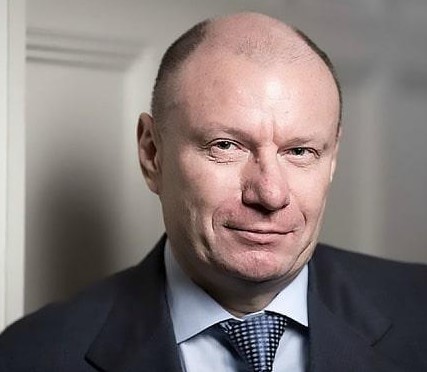Vladimir Potanin - RBC: "No need for confiscations, no need for nationalization"
The largest shareholder of Norilsk Nickel, Vladimir Potanin, spoke in an interview with RBC about the impact of Western sanctions on the company's business and on him personally,and also appreciated the idea to confiscate assets from foreigners and departed RussiansVladimir PotaninVladimir PotaninVladimir PotaninVladimir PotaninVladimir PotaninVladimir PotaninVladimir Potanin
About work and life under sanctions
Immediately after the start of RUSSIA's military operation in Ukraine, Western sanctions were imposed against most major Russian businessmen , but then the largest co-owner and HEAD of Norilsk Nickel, Vladimir Potanin (owns 37%), managed to avoid them. In June, the businessman came under British sanctions as the controlling owner of Rosbank, which he acquired in the spring from the French group Societe Generale, which left Russia (now the main shareholder of the bank is the Potanin charitable foundation with a share of 47.5%, another 45% from Interros). On December 15, the US Treasury imposed sanctions against Potanin, his children Ivan and Anastasia, his wife Ekaterina and the Nirvana yacht. The list of SDN, which involves the blocking of DOLLAR assets and operations, also includes the holding Interros and Rosbank owned by the businessman.
“Sanctions are absolutely destructive and even seem to be absolutely illegal. But who is watching now? Now the process of breaking the rules is underway,” notes Vladimir Potanin. — This situation is stressful for the country as a whole, people, economy and system. But the system turned out to be surprisingly resilient to such an impact.
However, he admits that much has changed due to the sanctions: “First of all, this can be divided into the production part and the household (personal). In terms of production, logistics chains have changed, payment systems have collapsed, and with all the ensuing consequences. For example, in Norilsk Nickel, working capital has grown significantly due to the slowdown in all these processes and their complication. Many projects are moved, as they say now, to the right. This is mainly due to the fact that there is a need for redesign, in search of new equipment, which we are denied by our ... language does not dare to call them partners.
Potanin also draws attention to restrictions on "movement and communication." “The changes are very significant. Starting with the fact that [this is] the loss of assets and certain prospects, which is always important for a businessman. For example, we had plans for some businesses to expand into other markets. Conversely, we have participated in various start-ups in other countries in the hope of bringing them to Russia to strengthen our existing businesses here. Such opportunities are now almost completely gone, ”he states. As a result, he had to restructure his investment policy, first of all, to place even greater emphasis on Russia: “The whole paradigm of our business, which was more tied to involvement in the international chain of product and technology creation, is now being reoriented to internal history with an attempt to involve some friendly countries and partners. Somewhere it works, somewhere it doesn't. In general, this is a major change in the planning system and in the system of expectations.”
Potanin's father worked at the Ministry of Foreign Trade of the USSR, the family traveled a lot, including abroad. Therefore, he got used to the fact that "the whole world is a zone for communication." “Therefore, restrictions on movement, on the ability to communicate with people, of course, affect,” the businessman now admits.
“But in my case, I think it was easy to readjust. For example, last summer, when I realized that I didn’t have to go anywhere, so as not to run into scandals, endless conversations about who was right and who was wrong, we just went on a boat along the Volga in a big company. I remembered my youth, pioneer camps, tourist bases, bonfires, songs with a guitar. It went great. He taught the kids to do what he did. So I think we'll be patient. There [in the West] they will come to their senses, and we will be patient, we will travel around our country, ”continues Potanin. “In everyday terms, you will say that the rich also cry,” he ironically.
Read on RBC Pro "Full collapse averted". How the energy crisis in the EU will develop “It looks like a punch in the stomach”: what sport saves Zuckerberg from overload Mulled wine: what is the use of a popular winter drink Sanatorium in a neighboring town:
The head of Norilsk Nickel believes that Russia has entered a period when it is necessary to learn how to live with these difficulties, working to overcome them. “We, as a single company and as a country, must [remain] in good shape and just survive this period and get to the shore, on which we will then build new rules for relations with all other countries and among ourselves,” he concludes.
video
About confiscation of assets from foreign companies
After the start of the special operation in Ukraine, the US and the EU froze almost half of Russia's gold and foreign exchange reserves, or about $300 billion. Since then, there have been repeated proposals in the West to transfer these assets to the restoration of Ukraine. In response, in May, State Duma Speaker Vyacheslav Volodin called for the confiscation of Russian assets of companies from "unfriendly countries." On November 14, the UN General Assembly adopted a resolution on the creation of an international mechanism that would provide compensation to Ukraine for the damage caused by "aggression by Russia." If this resolution leads to the withdrawal of Russia's frozen assets abroad, then Moscow can compensate for the losses by withdrawing funds from foreign investors within the country, Security Council Deputy Chairman Dmitry Medvedev said. According to him, the assets of foreign investors in Russia are estimated at more than $300 billion.
Potanin says some issues are black and white for him: “Confiscation [of assets] is a covert or overt form of theft. It destroys the investment climate of the jurisdiction in which it occurs.” He argues that the countries of the "collective West" built their society on certain values, among which the respect for private property was the cornerstone, and this is being destroyed. “They are doing it wrong. And it will hit them. And we don't have to repeat it. We must learn from the mistakes of others. Moreover, we already received our vaccination in 1917. Disrespect for the personal freedoms of people and the right to property has led, in aggregate, to bad consequences. You just need to be able to refrain from this, ”the businessman believes.
Potanin does not rule out that Western countries are deliberately provoking Russia according to the following formula: "Here we will illegally take away your property, and you will take it away, and we will be quits." But he is sure that you should not succumb to this: “Firstly, because then we will fight for this property of ours. The absence of a violation on our part of the generally accepted rules for the treatment of property gives us a great moral and psychological advantage, if not some kind of legal argument. And secondly, it is harmful inside. Entrepreneurial activity and people's motivation are built on respect for the right to property. Depriving them of that kind of motivation is a very harmful thing.”
The head of Norilsk Nickel also opposes the nationalization of foreign assets: “Our government encourages investment activity in every possible way. I myself was a participant in several strategic sessions at which Prime Minister Mikhail Vladimirovich Mishustin, along with other members of the government, looked for opportunities to stimulate investment.” According to him, the task of the state is to pick up only those areas that business cannot cover due to, for example, the lack of commercial prospects.
“I believe that this process should continue and be stimulated, including in terms of replacing foreign investment. If some companies leave our country, then instead of applying some kind of confiscation and other harsh measures to them, it is much easier to give the investment community the opportunity to solve this problem on its own. For this, he has every opportunity to replace foreign investments with domestic ones,” he says. The "panic exodus" of foreign companies from the Russian market meant that such companies could [be] acquired by domestic investors on very attractive terms, he admits. For example, Interros last May acquired Rosbank from the French Societe Generale. The amount of the transaction was not disclosed, but analysts assumed
“In principle, our economy is more likely to suffer from excessive state participation, so the new nationalization, in my opinion, runs counter to the financial and economic policy of our government and our country. We do not need to produce extra state property, especially in such areas as trade, high-tech, and so on. No need for confiscations, no need for nationalization. It is necessary to develop the investment climate and replace some investments with others - domestic and from friendly countries," Potanin believes.
About the nationalization of the property of the departed Russians
On December 28, Medvedev wrote on his TELEGRAM channel that opponents of the authorities who went abroad and called for the defeat of Russia should be considered "enemies of society" regardless of the "legal qualification of their deeds." Such people should not be allowed back into the country “until the end of their days,” and they should also be deprived of sources of income in Russia, he said. But presidential spokesman Dmitry Peskov explained that these words apply only to those who violate the law. Then Senator Sergei Tsekov proposed to confiscate the property of "all Russian citizens who left the country and criticize it" and send it to the needs of the participants in the special operation in Ukraine. “Regardless of whether they are stars or IT people,” he added.
Potanin strongly opposes the confiscation of property from Russians who have left the country: “Our country is very committed to communal, orthodox traditions. We are not greedy, for example, for all sorts of newfangled trends - I will say so politically correct - in matters of marriage and family. And we are firmly on it. Why do we think that it is possible to treat such fundamental institutions differently as property or respect for the person of a person?
“The programmers left, now there is a discussion about whether to let them back. People left, they probably had some reasons for this. Something confused them about what was happening, ”the businessman notes. “But most of them continue to work for our country, economy, companies. Some of them will return, some will not. Why push them away and drive? They will be hired by other companies, they are not made with a finger. This is our strength, not weakness, their brains, the ability to produce a product, which, by the way, we are sorely lacking, ”Potanin emphasizes. He reminds that in Russia own software is about 20%, and the rest has to be borrowed from other countries.
“Now we have to close this gap, and we need these people. We will restore the damage that the sanctions have caused to our economy, first of all, at the expense of people who are able to do this, so we must respect their convictions, which, perhaps, are somewhat disliked by more patriotic people. Tolerance must be shown, ”the businessman explains.
He is sure that there is no need to punish those who work for the Russian economy from abroad: “In general, we need to put an end to this demagoguery. People who harm and damage our country here or there must be judged, proved guilty and punished accordingly according to the law. And those who think differently should be judged by their contribution to the common cause. These guys who left, they make a contribution, they make their own product, which we really need. I would not discriminate them at all, at least for a sufficiently long period of time. The situation is acute, unusual. We have just talked about the fact that all ideas are collapsing. These young people are also losing their understanding of how the world works.”
Potanin proposes to give the Russians who left the opportunity to "feel, understand, try." “It seems to me that taking away property and stigmatizing people ahead of time is a sign of weakness, and we are a strong country, a strong nation, at least we dream of being perceived this way. Therefore, we must make strong moves, not weak ones. Violation of property rights is an impulsive, weak move. And punishing people for working, relatively speaking, from Yerevan or even from some Germany for our economy, is also an impulsive, populist move,” he concludes.
How Norilsk Nickel's plans and strategy have changed
Western sanctions have not been imposed against Norilsk Nickel, but they have an impact on the company's activities and force it to adjust its strategy. “We naturally find ways out of this situation. We are restructuring logistics chains to more friendly countries, primarily to CHINA , Turkey, Morocco and other Arab countries, Potanin says. “Therefore, this does not directly affect the life of the company, its survival, but, of course, it limits its capabilities, including financial ones and the development of those markets in which it has traditionally been. Keeping them is more difficult, and new ones are expensive to win. This is what everyone has to do."
Despite the fact that some plans had to be postponed, Norilsk Nickel "is developing and will continue to develop." The company's management did not cancel the growth program, but for this it will need more electricity, and existing thermal power plants will not be enough. “Heat in the Norilsk industrial region is produced enough, even in excess, it is electricity that is needed. Thermal power plants, as you know, produce both heat and energy. We wanted to replace the turbines with ones that produce more electricity, less steam. But our, so to speak, then American and German partners refused us this. We have found a way out - now we are working together with Rosatom on a project to install ground-based or, possibly, surface-based mini-nuclear reactors there,
According to him, this will not only allow Norilsk Nickel to find a replacement for imported equipment, but also help Rosatom develop the use of low-capacity nuclear power plants at industrial enterprises, which “have not yet been put on stream.”



























































